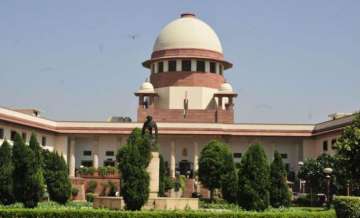Can't direct doctors to perform genital mutilation on small girls: SC
The practice of female genital mutilation resulted in "serious violations of basic fundamental rights of the victims who in these cases are minors," the plea said.
The Supreme Court today made it clear that it cannot direct doctors to perform genital mutilation of minor girls of the Dawoodi Bohra Muslim community and questioned the "scientific justification", if any, behind the procedure.
A bench headed by Chief Justice Dipak Misra, which was hearing a PIL challenging the practice, questioned the process saying that there was hardly any rationale behind it as a girl child is forced to undergo it due to non-medical reasons.
"Do you (A M Singhvi) wish us to pass an order under Article 142 (which provides extraordinary powers to the Supreme Court to pass any order in the interest of justice) of the Constitution asking doctors to perform this procedure in a hospital? How it can be done?
"What is the scientific justification to direct doctors to perform this procedure," the bench, also comprising justices A M Khanwilkar and D Y Chandrachud, asked senior lawyer Singhvi, representing a Muslim group which supported the practice.
It said asking doctors to perform this kind of procedure would also be violative of medical ethics.
Catch all the latest news about Lok Sabha elections 2019 HERE
The observation came when the senior lawyer said the court may issue directions to ensure proper safety measures in conducting the procedure.
Singhvi said the Dawoodi Bohras have been the most progressive and educated among the Muslim communities and the practice is not so grave as has been made out by those opposing it.
He said the practice has also been an essential religious practice which was protected under Article 25 (freedom of conscience and free profession, practice and propagation of religion) of Constitution.
The bench asked about the standard operating procedure (SOP) for performing the mutilation on small minor girls.
"What is your standard operating procedure (SOP). I am thinking about the trauma of a child who would be crying and objecting to it. Somebody has to hold the child down as there is no anaesthesia, no hospital...," Justice Chandrachud asked.
The senior lawyer said that same thing happened when a child is vaccinated and moreover, extreme care and caution are taken as the procedure is conducted under the supervision of the mother.
Attorney General K K Venugopal, appearing for the Centre, reiterated the government's stand that it was opposing the practice and said that this has been banned in many countries like the US, the UK, Australia and around 27 African nations.
The practice causes irreparable harm to girl children and has many health repercussions, the top law officer said and referred to Article 25 to highlight the point that a religious practice can be stopped if it was against "public order, morality and health".
The bench has now posted the PIL, filed by Delhi-based lawyer Sunita Tiwari against the practice in the community, for further hearing on August 9 and 10.
Earlier, the court had questioned the prevalent practice of mutilation of minor girls in the community, saying that the women cannot be "subjugated" to the level where they have to "please" their husbands only.
Senior advocate Indira Jaising, appearing for Masooma Ranalvi, a lawyer who herself has been a victim of mutilation, had said the practice of "removal of the clitoral hood" for non-medical purposes of a minor constituted an offence under the IPC and the Protection of Children from Sexual Offences Act (POCSO Act).
"Something which has been declared illegal and criminal by the law cannot the essential practice of religion. This constituted an offence under the IPC and the POCSO Act," she had said.
The court had on May 8 agreed to examine the issues raised in the PIL by saying that the practice of female genital mutilation was "extremely important and sensitive".
Tiwari, in her plea, sought a direction to the Centre and the states to "impose a complete ban on the inhuman practice" of 'khatna' or "female genital mutilation" throughout the country.
The plea has sought a direction to make it an offence on which the law enforcement agencies can take cognisance on their own. It has also sought to make the offence "non-compoundable and non-bailable" with provision for harsh punishment.
The practice of female genital mutilation resulted in "serious violations of basic fundamental rights of the victims who in these cases are minors," the plea said.
Female genital mutilation is performed "illegally upon girls (between five years and before she attains puberty)" and is against the "UN Convention on the Rights of the Child, UN Universal Declaration of Human Rights of which is India is a signatory", the plea said, adding the practice caused "permanent disfiguration to the body of a girl child".
"The practice of 'khatna' or female genital mutilation or 'Khafd' also amounts to causing inequality between the sexes and constitutes discrimination against women. Since it is carried out on minors, it amounts to serious violation of the rights of children as even minors have a right of security of person, right to privacy, bodily integrity and the freedom from cruel, inhumane or degrading treatment," the plea said.
"It violates the rights of the child and human rights. It also violates the Universal Declaration of Human Rights and is a crime in the Unites States of America under the Illegal Immigration Reform and Immigrant Responsibility Act of 1996 and now a crime in Australia and some other countries as well," it claimed.
